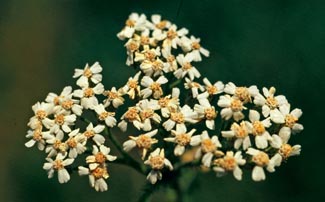Western Yarrow

Common Name(s):
Western Yarrow
Yarrow
Scientific Name:
Achillea millefolium L.
Scientific Name Synonyms:
None known
Symbol:
ACMI2
Description:
Life Span: Perennial
Origin: Native
Season: Cool
Growth Characteristics: An erect forb, arising singly or as a loose cluster, growing 6 to 24 inches tall. The stems have dense wooly hairs. It flowers April to July, and reproduces from seeds and rhizomes.
Flowers/Inflorescence: Flowers are white to pink or pinkish-white colored, all with yellow centers. They are borne in flat-topped corymb.
Fruits/Seeds: Fruit is a flattened achene.
Leaves: Alternate, simple, fern-like. Surfaces pubescent, aromatic.
Ecological Adaptions:
Occurs in prairies, sagebrush plains, pastures, roadsides, and disturbed sites. It grows from the semi-desert zone up to the subalpine zone. It has some shade and drought tolerance.
Soils: Adapted to a broad range of soils, but does best on sandy and gravelly loam.
Associated Species: Aspen, big sagebrush, wheatgrasses, and bluegrasses.
Uses and Management:
Yarrow provides poor to fair cattle forage and fair to good sheep forage, especially the inflorescence. It is usually grazed only when its green, and it may contain toxic alkaloids and glycosides.
An excess of this plant on mountain range indicates the need for lighter grazing or rest.
According to tradition, the plant was first named by Achilles, hence its scientific name.
Native Americans used tea made from yarrow to relieve ear-, tooth-, and headaches; as an eyewash; to reduce swelling; as a cold remedy; and as a tonic or stimulant. Yarrow varies in taste and in potency depending on where it grows and at what stage of growth it is in. The best time to collect yarrow for tea is right before the flowers are produced, using only the new succulent leaves. Green leaves were use to relieve itching, chewed for toothaches, and used as a mild laxative. During the Civil War, yarrow was widely used to treat wounds and became known as "soldiers' woundwort." An ethanol extract of yarrow has mosquito- repelling properties.

